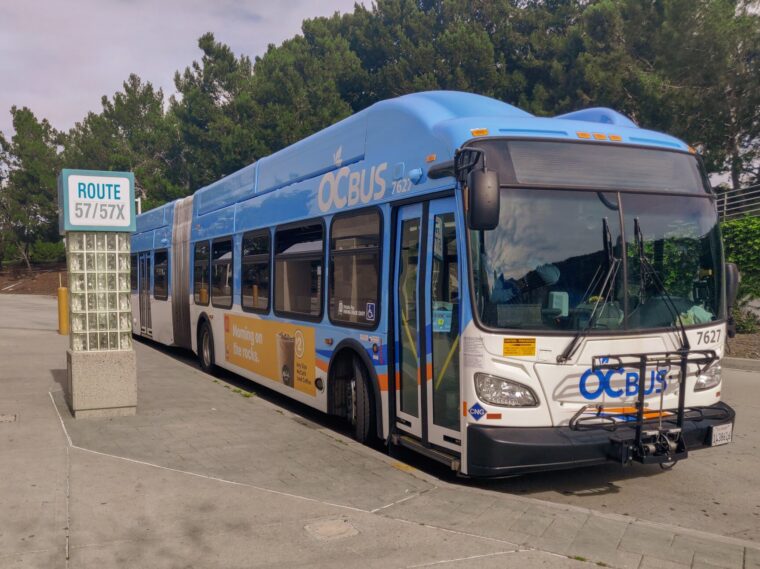
The Orange County Transportation Authority (OCTA) Board of Directors in California has approved buying 50 new zero-emission buses, a significant step toward the goal of transitioning the entire bus fleet to be emission free by 2040. The purchases will replace compressed natural gas vehicles that have reached the end of their operational lifespan.
Although compressed natural gas is a comparably clean-burning fuel and a significant move away from the polluting diesel technology of previous generations, both hydrogen and battery-electric buses emit no pollutants into the air.
“I’m proud that OCTA is an industry leader in transitioning to zero-emission technology,” OCTA Chair Tam T. Nguyen said. “And I’m glad we’re helping set the standard for a future in where our passengers can continue to count on reliable bus service while protecting our environment.”
RELATED: California investing $1.3 billion for transformative rail and transit projects
The shift to zero-emission technology follows the California Air Resources Board’s (CARB) 2018 Innovative Clean Transit Rule, which requires all public transit agencies in the state to convert their bus fleets to zero-emission vehicles by 2040. The rule stipulates that 25% of new bus purchases must be zero-emission beginning in 2023, rising to 50% by 2026, and reaching 100% by 2029.
OCTA will acquire 40 hydrogen fuel-cell electric buses and 10 battery-electric buses, each measuring 40 feet. Each of the new buses will come with a complete range of technological and safety features, such as video surveillance systems, reverse cameras, fire and hydrogen detection systems, driver barriers and electronic fare collection devices.
As part of its Zero-Emission Bus (ZEB) Pilot Program, OCTA began testing fuel-cell buses in 2020 and battery-electric buses in 2022. The program included 10 buses of each type and tested both in real-world conditions on Orange County streets, providing OCTA with important operational and technological insights, helping to identify the most effective technology — or combination of technologies — to meet riders’ needs.
Although the cost of acquiring zero-emission technology mandated by the state is significantly higher than that of a standard compressed natural gas bus, OCTA is working to lower expenses and secure funding to comply with the CARB rule.
Funding for these buses comes from a combination of Federal Transit Administration grants and state assistance from California Climate Investments, a statewide program that uses cap-and-trade funds to reduce greenhouse gas emissions, boost the economy and improve public health and the environment, particularly in disadvantaged communities.
In a separate action, the OCTA board also approved the purchase of 11 battery chargers for the new buses. The chargers, costing $2.2 million, will be installed at OCTA’s bus base in Santa Ana, where the new battery-electric buses will be charged and maintained.
Both types of new bus are expected to begin service in late 2026.
Photo courtesy Miles Riehle, CC BY-SA 4.0 https://creativecommons.org/licenses/by-sa/4.0, via Wikimedia Commons
The post Orange County, Calif., transit agency purchasing 50 new buses to meet state’s emissions rules appeared first on Government Market News.

